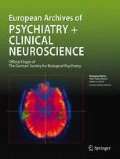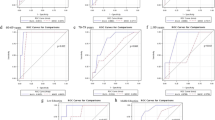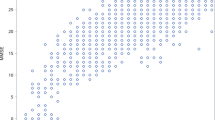Abstract
Background
The Mini-Mental State Examination (MMSE) is the most widely used instrument for the screening of cognitive impairment worldwide, but its ability to produce valid estimates of dementia in populations of low socioeconomic status and minimal literacy skills has not been adequately established. The authors investigated the psychometric properties of the MMSE in a community-based sample of older Brazilians.
Method
Cross-sectional one-phase population-based study of all residents of pre-defined areas of the city of Sao Paulo, aged 65 years or over. The Brazilian version of the MMSE was compared with DSM-IV diagnosis of dementia assessed with a harmonized one-phase procedure developed by the 10/66 Dementia Research Group.
Results
Analyses were performed with 1,933 participants of the SPAH study. Receiver operating characteristic analysis showed that the MMSE cut-point of 14/15 was associated with 78.7% sensitivity and 77.8% specificity for the diagnosis of dementia amongst participants with no formal education, and the cut-point 17/18 with 91.9% sensitivity and 89.5% specificity for those with at least 1 year of formal education (areas under the curves 0.87 and 0.94, respectively; P = 0.03). Even with these best fitting cut-points, the MMSE estimate of the prevalence of dementia was four times higher than determined by the DSM-IV criteria. Education, age, sex and income influenced MMSE scores, independently of dementia caseness.
Conclusion
The MMSE is an adequate tool for screening dementia in older adults with minimum literacy skills, but misclassification is unacceptably high for older adults who are illiterate, which has serious consequences for research and clinical practice in low and middle income countries, where the proportion of illiteracy among older adults is high.

Similar content being viewed by others
References
Almeida OP (1998) Mini mental state examination and the diagnosis of dementia in Brazil. Arq Neuropsiquiatr 56:605–612
American Psychiatric Association (1994) Diagnostic and statistic manual of mental disorders: DSM-IV. Donnelley & Sons Company, Washington
Bachman DL, Wolf PA, Linn R, Knoefel JE, Cobb J, Belanger A, D’Agostino RB, White LR (1992) Prevalence of dementia and probable senile dementia of the Alzheimer type in the Framingham Study. Neurology 42:115–119
Bertolucci PH, Brucki SM, Campacci SR, Juliano Y (1994) The mini-mental state examination in a general population: impact of educational status. Arq Neuropsiquiatr 52:1–7
Bisoffi G, Mazzi MA, Dunn G (2000) Evaluating screening questionnaires using receiver operating characteristics (ROC) curves from two-phase (double) samples. Int J Methods Psychiatr Res 9:121–133
Black SA, Espino DV, Mahurin R, Lichtenstein MJ, Hazuda HP, Fabrizio D, Ray LA, Markides KS (1999) The influence of noncognitive factors on the mini-mental state examination in older Mexican-Americans: findings from the Hispanic EPESE. Established population for the epidemiologic study of the elderly. J Clin Epidemiol 52:1095–1102
Bravo G, Hebert R (1997) Age- and education-specific reference values for the mini-mental and modified mini-mental state examinations derived from a non-demented elderly population. Int J Geriatr Psychiatry 12:1008–1018
Cerqueira ATAR (2003) Deterioração cognitiva e depressão. In: Lebrão MS, Duarte YAO (eds) Saúde, Bem-estar e Envelhecimento—O Projeto SABE no município de São Paulo: uma abordagem inicial. Organização Panamericana de Saúde, São Paulo, pp 143–165
Cohen JE (2003) Human population: the next half century. Science 302:1172–1175
Copeland JR, Dewey ME, Griffiths-Jones HM (1986) A computerized psychiatric diagnostic system and case nomenclature for elderly subjects: GMS and AGECAT. Psychol Med 16:89–99
Crum RM, Anthony JC, Bassett SS, Folstein MF (1993) Population-based norms for the mini-mental state examination by age and educational level. JAMA 269:2386–2391
Cummings JL (1993) Mini-mental state examination. Norms, normals, and numbers. JAMA 269:2420–2421
Dewey ME, Copeland JR (2001) Diagnosis of dementia from the history and aetiology schedule. Int J Geriatr Psychiatry 16:912–917
Ferri CP, Prince M, Brayne C, Brodaty H, Fratiglioni L, Ganguli M, Hall K, Hasegawa K, Hendrie H, Huang Y, Jorm A, Mathers C, Menezes PR, Rimmer E, Scazufca M (2005) Global prevalence of dementia: a Delphi consensus study. Lancet 366:2112–2117
Folstein MF, Folstein SE, McHugh PR (1975) Mini-mental state: a practical method fro grading the cognitive state of patients for the clinician. J Psychiatr Res 12:189–198
Ganguli M, Hendrie HC (2005) Screening for cognitive impairment and depression in ethnically diverse older populations. Alzheimer Dis Assoc Disord 19:275–278
Ganguli M, Ratcliff G, Huff FJ, Belle S, Kancel MJ, Fischer L, Seaberg EC, Kuller LH (1991) Effects of age, gender, and education on cognitive tests in a rural elderly community sample: norms from the Monongahela Valley independent elders survey. Neuroepidemiology 10:42–52
Grigoletto F, Zappala G, Anderson DW, Lebowitz BD (1999) Norms for the mini-mental state examination in a healthy population. Neurology 53:315–320
Hall KS, Hendrie HH, Brittain HM, Norton JA, Rodgers DD, Prince CS, et al (1993) The development of a dementia screening interview in two distinct languages. Int J Methods Psychiatr Res 3:1–28
Hall KS, Gao S, Emsley CL, Ogunniyi AO, Morgan O, Hendrie HC (2000) Community screening interview for dementia (CSI ‘D’); performance in five disparate study sites. Int J Geriatr Psychiatry 15:521–531
Herrera E Jr, Caramelli P, Silveira AS, Nitrini R (2002) Epidemiologic survey of dementia in a community-dwelling Brazilian population. Alzheimer Dis Assoc Disord 16:103–108
Instituto Brasileiro de Geografia e Estatística—IBGE (2002) Perfil dos Idosos Responsáveis pelos Domicílios no Brasil 2000. Estudos and Pesquisas. Informação Sociodemográfica e Socioeconômica 9. IBGE, Rio de Janeiro
Instituto Brasileiro de Geografia e Estatística—IBGE. Censo (2000) Brazil. http://www.ibge.gov.br/censo 2000
Katzman R, Zhang MY, Ouang YQ, Wang ZY, Liu WT, Yu E, Wong SC, Salmon DP, Grant I (1988) A Chinese version of the mini-mental state examination; impact of illiteracy in a Shanghai dementia survey. J Clin Epidemiol 41:971–978
Laks J, Baptista EM, Contino AL, de Paula EO, Engelhardt E (2007) Mini-mental state examination norms in a community-dwelling sample of elderly with low schooling in Brazil. Cad Saude Publica 23:315–319
Lourenço RA, Veras R (2006) Mini-mental state examination: psychometric characteristics in elderly outpatients. Rev Saude Publica 40:1–8
Menendez J, Guevara A, Arcia N, Leon Diaz EM, Marin C, Alfonso JC (2005) Chronic diseases and functional limitation in older adults: a comparative study in seven cities of Latin America and the Caribbean. Rev Panam Salud Publica 17:353–361
Morris JC, Heyman A, Mohs RC, Hughes JP, van Belle G, Fillenbaum G, Mellits ED, Clark C (1989) The consortium to establish a registry for Alzheimer’s disease (CERAD). Part I. Clinical and neuropsychological assessment of Alzheimer’s disease. Neurology 39:1159–1165
Prince M (2000) Methodological issues for population-based research into dementia in developing countries. A position paper from the 10/66 dementia research group. Int J Geriatr Psychiatry 15:21–30
Prince M, Acosta D, Chiu H, Copeland J, Dewey M, Scazufca M, Varghese M (2004) Effects of education and culture on the validity of the geriatric mental state and its AGECAT algorithm. Br J Psychiatry 185:429–436
Prince M, Acosta D, Chiu H, Scazufca M, Varghese M (2003) Dementia diagnosis in developing countries: a cross-cultural validation study. Lancet 361:909–917
Roth M, Huppert FA, Montjoy CQ, Tym E (1999) CAMDEX-R: the Cambridge examination for mental disorders of the elderly. Cambridge University Press, Cambridge
Rothman KJ, Greenland S (1998) Modern epidemiology. Lippincott-Raven, Philadelphia
Scazufca M, Menezes PR, Vallada HP, Crepaldi AL, Pastor-Valero M, Coutinho LM, Di Rienzo VD, Almeida OP (2008) High prevalence of dementia among older adults from poor socioeconomic backgrounds in Sao Paulo, Brazil. Int Psychogeriatr 20:394–405
Scazufca M, Seabra CA (2007) Sao Paulo portraits: ageing in a large metropolis. Int J Epidemiol. doi: 10.1093/ije/dym154, published on line 31 July 2007
Stewart R, Johnson J, Richards M, Brayne C, Mann A (2002) The distribution of mini-mental state examination scores in an older UK African-Caribbean population compared to MRC CFA study norms. Int J Geriatr Psychiatry 17:745–751
Tombaugh TN, McIntyre NJ (1992) The mini-mental state examination: a comprehensive review. J Am Geriatr Soc 40:922–935
United Nations Department of Economic and Social Affairs (2002) World Population Ageing 1950–2050. United Nations, New York
Welsh KA, Butters N, Mohs RC, Beekly D, Edland S, Fillenbaum G, Heyman A (1994) The consortium to establish a registry for Alzheimer’s disease (CERAD). Part V. A normative study of the neuropsychological battery. Neurology 44:609–614
Zhou DF, Wu CS, Qi H, Fan JH, Sun XD, Como P, Qiao YL, Zhang L, Kieburtz K (2006) Prevalence of dementia in rural China: impact of age, gender and education. Acta Neurol Scand 114:273–280
Acknowledgments
We are grateful to all members of the research team that contributed to the data collection. We thank Prof. M. Prince for helping with the acquisition of funding. The study was funded by the Wellcome Trust, UK (grant code GR066133MA). MS was supported by the Welcome Trust and CNPq-Brazil during the development of this work. PRM and HP Vallada were partly funded by CNPQ- Brazil.
Author information
Authors and Affiliations
Corresponding author
Rights and permissions
About this article
Cite this article
Scazufca, M., Almeida, O.P., Vallada, H.P. et al. Limitations of the Mini-Mental State Examination for screening dementia in a community with low socioeconomic status. Eur Arch Psychiatry Clin Neurosci 259, 8–15 (2009). https://doi.org/10.1007/s00406-008-0827-6
Received:
Accepted:
Published:
Issue Date:
DOI: https://doi.org/10.1007/s00406-008-0827-6




